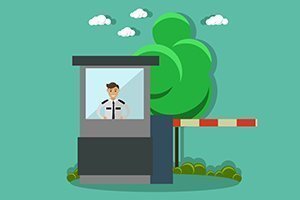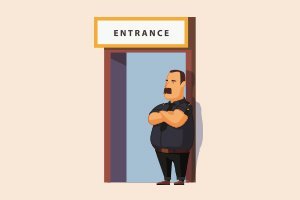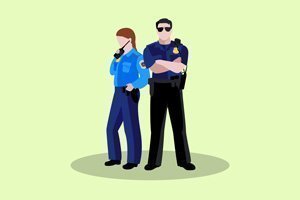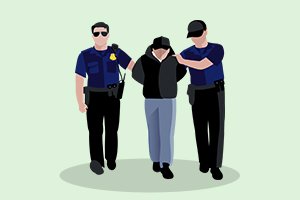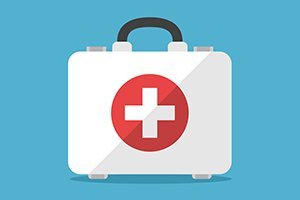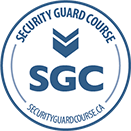How do I get my Security Guard License or Private Investigator License in Ontario?
If you are looking to become a Security Guard or Private Investigator in Ontario, you will need to complete our training courses and pass a provincial exam to receive your Security Guard License or Private Investigator License. To address any concerns you may have, here are some answers to frequently asked questions:
How do I become a Security Guard?
To become a security guard in Ontario, you must purchase and complete our security guard training course and produce a valid First Aid and CPR Certificate. Then you will be able to register for the Ontario Security Guard Licence Exam using the Training Completion Number (TCN) we provide to you.
The passing mark for the security guard test is 62% (37/60). When you pass, you can apply for the security guard licence. If you fail, you can take the test again as many times as necessary, but you must pay the full test fee for each attempt.
Do I have to do First Aid training if I already have a valid First Aid certificate?
If you already have a valid First Aid and CPR Certificate simply email us a copy. If you do not, simply purchase our Emergency First Aid training and we will coordinate your class.
A list of providers approved to deliver First Aid training is available on the Workplace Safety Insurance Board website.
How do I become a Private Investigator?
To become a private investigator in Ontario, you must first purchase and complete our private investigator training course. Once you’ve completed the required 50hours of online study you’ll be able to register for the Ontario Private Investigator Licence Exam using the Training Completion Number we provide to you.
The passing mark for the private investigator test is 77% (46/60). When you pass, you can apply for the private investigator licence. If you fail, you can take the test again as many times as necessary, but you must pay the full test fee for each attempt.
How do I get my basic training completion number (TCN)?
SGC processes your TCN upon completion of our Security Guard or Private Investigator course. It is then emailed to you by Serco. You need your TCN to book your online exam. Check out Serco’s website here for more details on booking your exams.
Can I get a licence that allows me to work as both a security guard and a private investigator?
Yes. This is called a Dual Licence. You must complete both our Dual Course and pass both the SG and PI exams. Many of our students complete the Security Guard course first, write and pass that exam, then complete the Private Investigator course and pass that exam. Then they apply for the Dual License.
Will I get a certificate at the end of my Basic Training course?
Yes, SGC issues all graduates an official Training Certificate. Training Certificates include the following information:
- Student name;
- Training entity name;
- Type of training completed (i.e., security guard and/or private investigator);
- Date training completed; and
- Signature of training entity representative.
What are a security guard’s duties and responsibilities?
The responsibilities of a security guard are largely dependent on the organization they are working for. However, there are some basic duties that must be carried out, regardless of where they work. Here are a few universal duties that all security guards must fulfill:
- Observe and report
Security guards should constantly be observing the area in which they’re stationed. If they observe any suspicious behaviour they should take note, and report it to other security guards in the area. This is especially important if a dangerous situation has just been resolved —guards should still be on the lookout to make sure no additional problems arise. In addition, security guards should report all incidents to their supervisor, police, or other appropriate authorities. - Respond quickly and effectively
Situations can escalate quickly, and it’s a security guard’s responsibility to respond just as fast. Acting fast to control an escalating issue can help solve it faster, so that things can return to normal as soon as possible. Security guards should be properly trained and well-prepared to react and handle dangerous situations. - Protect
No matter where a security guard works, one of their main responsibilities is to provide security for those around them. Being alert and identifying potentially dangerous situations is a part of protecting the public, but they must also know how to address situations that have already escalated. Their job is provide a sense of security, and should be able to do so by protecting themselves and others. - Get help
Security guards are licensed, but are only trained to handle a certain degree of danger. For example, while they are well versed in emergency first aid and CPR, they should call for professional medical help when necessary. Their job is to assist until help arrives but must also remember that it’s a part of their job to get help when it’s required.
Do I need to renew my security guard licence?
Yes. Your licence will expire two birthday after the date it was issued if you do not renew it. Check out Service Ontario’s website here for applications to apply and renew your license.
Why is it important to have a security guard(s)?
It’s important to have security guards to monitor a premises to prevent theft and property destruction, and to keep an eye on potentially dangerous situations and diffuse them before they escalate.
What is a security guard’s salary in Ontario?
The starting wage for a security guard in Ontario is $14/hour. Your salary may vary depending on the company you work for, and your level of experience. Check out some of our featured employers here for more information.
What are a security guard’s working hours?
The hours you’ll work as a security guard depend on where you work. You may be required to sit behind a counter from 9 am- 5 pm everyday, or you may be required to work 12 hour shifts on a rotating basis (sometimes called continental shifts), or you may work in event security and the hours will depend on the event.
Are security guard jobs dangerous?
Security guard jobs don’t come without risk. However, the amount of danger that you will encounter is largely dependent on where you work and how you conduct yourself. For example, you’ll likely encounter more danger or volatile individuals working at a bar or nightclub, than if you were working security at a condominium or commercial building. Check out our Bar Security course for specialized training.
Can a security guard detain someone for trespassing?
Security guards have the right to detain someone that has committed a crime. They are allowed to make a citizen’s arrest, and then turn the detained party over to the police as soon as possible. You will learn about the TPA – Trespass To Property Act in our Security Guard Course.
What’s the difference between a security guard and a private investigator?
A security guard is meant to be visible and provide a sense of security to those around him or her. Guards are trained to address dangerous situations, and have full knowledge of First aid and CPR. A Security Guard is trained to observe and report and enforce private property rules.
Private investigators on the other hand are typically employed to investigate the actions or whereabouts of individuals. They can follow individuals and gather information at the direction of their client. Unlike security guards, investigators do not provide private property protection. Check out our Private Investigator course here.
What can a private investigator do for me?
Private investigators can perform real-time observation, or a digital investigation to collect information. Investigators can help clients track down missing relatives, monitor unfaithful spouses, find stolen property, interview witnesses and collect evidence on fraudulent activity.
Can a private investigator hack into a computer or cell phone to collect data?
It is illegal to access a private computer, cell phone records, texts or any other cell phone data. While private investigators can help you investigate cases that the police won’t, they are still required to work within the law. While they can’t hack into personal devices, investigators have other ways of gathering information.
What type of jobs can I do with a security guard licence?
A security guard licence allows you to work in a job where you mainly protect persons or private property.
This includes working as a:
- security guard
- bodyguard / close protection
- bar security (bouncer), or
- loss prevention employee.
What type of jobs can I do with a private investigator licence?
A private investigator licence allows you to be employed and paid to investigate:
- the character or actions of a person
- a person’s business or occupation, or
- the whereabouts of persons or property.
What identification documents do I need to submit with my application?
You will need copies of two separate pieces of valid identification. One piece must prove that you are eligible to work in Canada. The other piece should be government issued and feature a photograph, your full legal name, your signature and your date of birth.
If you are applying by mail, you will need to submit photocopies of these documents. For online applications, you will need to scan these documents and have them ready to upload before you begin the application process.
Acceptable identification documents are listed in the application instructions.
What is a guarantor?
In order to perform a criminal record check, the ministry requires all applicants to have a guarantor (someone who can confirm their identity). The guarantor must sign and date the Guarantor Information Form. Applications cannot be processed without a signed confirmation from a guarantor.
Any individual who has known you personally for at least two years can act as a guarantor. The guarantor can also be chosen from a list of professions included in application instructions.
The guarantor must be able to confirm information such as your name, approximate age, place of birth, physical description and some personal details such as occupation and place of residence. A family member can act as a guarantor if he or she meets all of these requirements.
Guarantors must be at least 18 years old on the date when the application is submitted. If the Ministry is unable to reach a guarantor, the application may be delayed or returned.
In what circumstances can the Registrar suspend or revoke a licence?
The Registrar can suspend or revoke a licence due to a breach of the Private Security and Investigative Service Act, 2005 or its regulations, including the Code of Conduct.
Licences will be revoked if the licence holder is convicted of a prescribed offence.
Can I get a licence if I have a criminal record?
The Eligibility to Hold a Licence – Clean Criminal Record regulation lists over 80 different offences that prevent you from getting a licence, unless you receive a pardon. These are known as prescribed offences.
Within five days of being convicted of a prescribed offence, you must update your criminal record information online.
How often do I need a criminal record check?
A criminal record check will be done when you apply for a new licence and every time you renew your licence.
I already have a security guard license or private investigator licence from outside of Ontario. Do I need an Ontario licence to work in Ontario?
Yes. An Ontario licence is required in order to work as a security guard and/or private investigator in Ontario. If you hold a valid security guard licence or private investigator licence from another province or territory and if that licence was issued to you after successful completion of training and/or testing you may be exempt from training and testing in Ontario.
Do I need to notify the ministry if there is a change in address?
Yes. For security reasons you are required to notify the ministry in writing of your change of address.
You can update your address online.
Who can ask to see my licence?
In the interest of public safety, any member of the public has the right to know that they are dealing with a licensed security guard.
If you are a security guard, anyone can ask to see your licence. You must show the front of your licence, which includes your licence number, name and photo. You are not required to hand over your licence to a member of the public or show the back of your licence.
In order to allow for undercover work, licensed private investigators do not have to identify themselves as private investigators. However, if an individual presents him or herself as a private investigator, he or she must show a licence upon request.
Are there any exemptions from the requirement to carry a licence?
There are exemptions. Bodyguards from other provinces providing services to those in the film and television industry do not need an Ontario licence, as long as the bodyguard holds a valid licence from another jurisdiction.
In addition, the following individuals do not need a licence from the ministry:
- Practicing barristers or solicitors.
- People who receive payment for work that consists mainly of searching for and providing information about:
- the financial credit rating of individuals,
- the qualifications and suitability of people applying for insurance and indemnity bonds, or
- the qualifications and suitability of people as employees or prospective employees.
- People who are acting as peace officers.
- Insurance adjusters, insurance companies and their employees licensed under the Insurance Act while acting within the regular scope of their employment
- People living outside Ontario who are licensed employees of a private investigation agency licensed or registered in a jurisdiction outside Ontario, but elsewhere in Canada who:
- On behalf of a person living outside Ontario, make an investigation or inquiry partly outside Ontario and partly within Ontario; and
- Come into Ontario solely for the purpose of that investigation or inquiry.
- People who are paid for work that consists mainly of providing advice about security requirements but who are not selling the services of private investigators or security guards
- People who are paid for work that consists mainly of providing an armoured vehicle service
- Locksmiths, and
- Any class of people exempted by the regulations.
There is a general exemption for those conducting an investigation authorized by another federal or provincial Act.
Is it possible to find out why I got some answers wrong on the test?
In order to preserve the integrity and security of the test questions, we do not provide candidates who write the test with feedback on test results. Private investigators and security guards are expected to possess a broad understanding of the curriculum and have the ability to apply such knowledge to real life situations.
Can I work as a security guard or private investigator if I’ve completed all of the necessary steps, but my licence card hasn’t arrived in the mail yet?
Yes.
If you apply for a licence online through ServiceOntario, you will be able to access a digital licence through your online account as soon as your application is approved.
The digital licence includes a QR code which can be used to verify the information printed on the licence. You must replace the printed digital licence with your plastic licence card once it arrives by mail.
After it has arrived, you must carry your license on your person in accordance with the PSISA. Working without a valid licence is a violation of the Private Security and Investigative Services Act and may lead to charges.

